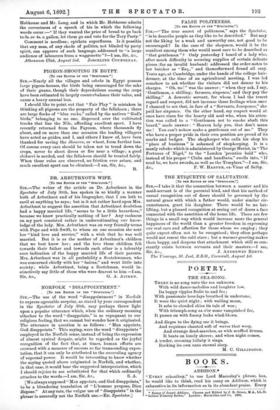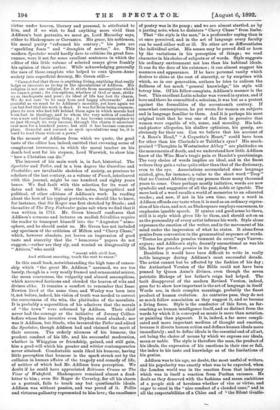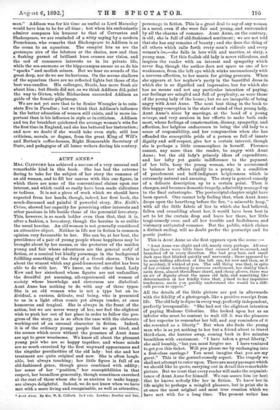BOOKS.
ADDISON.*
"EVERY schoolboy," to use Lord Macaulay's phrase, has, he would like to think, read his essay on Addison, which is exhaustive in its information as in its abundant praise. Every • Essays of Joseph Addison. Chosen and Edited by J. R. Green, M.A., LL.D. "Golden Treasury Series." London : Macmillan and Co. 1882.
'virtue under heaven, literary and personal, is attributed to him, and if we wish to find anything more vivid than Addison's best portraits, we must go, Lord Macaulay says, either to Shakespeare or Cervantes. His grace, his nobleness, his moral purity "reformed his century ; " his jests are
sparkling foam" and "draughts of nectar," &c. This modern Spectator would hardly dare to criticise its great fore- runner, were it not for some excellent sentences in which the editor of this little volume of selected essays gives frankly
his opinion of their author. While acknowledging generally the uses of those essayists who helped to coax Queen-Anne
society into superficial decency, Mr. Green still— "Cannot feel that there is anything living, anything that really helps or interests us to-day in the speculations of Addison. His religion is not our religion, for it starts from assumptions which we cannot grant ; its conceptions, whether of God or man, strike us as inadequate and poor ; its ideal of life has lost its charm. We do not care to be easy here and happy afterwards.' And grateful as we must be to Addison's morality, yet here again we can but feel that his work is dead. It was far from being common- place to men who had left behind them ages in which morals had baen lost in theology, and to whom the very notion of conduct was anew and fascinating thing ; it has become commonplace to us just through its very success, through the charm it exercised over men for a hundred years ; but still it has become common- place. Graceful and earnest as such speculations may be, it is hard to read them without a yawn."
In the memoir of Addison from which we quote, the good taste of the editor has, indeed, omitted that crowning scene of
complacent irreverence, in which the moral teacher on his death-bed sent for his stepson, Lord Warwick, to show him " how a Christian can die."
The interest of his main work is, in fact, historical. The .Spectator and Taller, and in a less degree the Guardian and Freeholder, are invaluable sketches of society, as precious to scholars of the last century, as a volume of Punch, interleaved with this journal, might be one hundred and eighty years
hence. We find fault with this selection for its want of dates and index. We miss the notes, biographical and political, of other editions of Addison's work. In reading
about the best of his typical portraits, we should like to know, for instance, that Sir Roger was first sketched by Steele; and the satire of The Tory Foxhunter gains salt when we find that it W11.13 written. in 1714. Mr. Green himself confesses that Addison's sermons and lectures on modish frivolities require
the reader to transport himself into the " Augustan " atmo- sphere, and he should assist us. Mr. Green has not included any specimen of the criticism of Milton and "Chevy Chase," which, however obsolete, yet leaves an impression of good taste and sincerity that the " humorous " papers do not suggest,—rather are they sly, and remind us disagreeably of ' Atticus," who could
"assent with civil leer,
And without sneering, teach the rest to sneer."
In this small book, notwithstanding the high tone of censor- ship which "the great Mr. Addison" assumed, we see too barely, though in a very neatly framed and ornamental mirror, the mean coarseness, the vulgarity and absurd assumptions,
which narrowed horizons and clouded the heaven of wits and divines alike. It remains a comfort to remember that Isaac Newton lived at the same time, and Wesley was born into it, not before, indeed, his vision of truth was needed to correct the correctness of the wits, the platitudes of the moralists.
It is probably a superstition of his admirers that the morals of "the town" were reformed by Addison. Their chief never had the courage or the initiative of Jeremy Collier, before whose fine invective even Dryden stood abashed; nor was it Addison, but Steele, who invented the Tatter and edited the Spectator, though Addison had and claimed the merit of -their success. The orderly niceness of his humour, the prudent conduct of his life, and his successful moderation,
whether in Whiggism or friendship, gained, and still gain, him a good-will which his greater and wittier contemporaries never attained. Comfortable souls liked his humour, having little p.erception that humour is the spark struck out by the collision in human affairs of the tragedy and comedy of life,
of neither of which had Mr. Addison keen perception. We doubt if he could have appreciated Robinson Crusoe or The Vicar of Wakefield. Shakespeare remained almost a dead- letter to him ; even Sir Roger de Coverley, for all his charm
as a portrait, fails to touch any but questionable ideals. Addison was without passion, and was proud of it. Polite and virtuous gallantry represented to him love; the excellence
of poetry was in its pomp ; and we are almost startled, as by a jarring note, when he disinters "Chevy Chase" from limbo.
That "the style is the man," is a profounder saying than is at once perceived, and in the art of language every faculty can be used either well or ill. No other art so differentiates the individual artist. His senses may be proved dull or keen by the variations in his perception of things ; we read character in his choice of subjects or of words. Style suggests his ordinary environment not less than his habitual ideals. It can fix the date of his existence; it can almost suggest his manners and appearance. If he have personal vanity which desires to shine at the cost of sincerity, or by surprises with which, as in our generation, authors he tries to enliven the dullness of too much "general knowledge," his style will- betray him. Of his fellow-essayists, Addison's manner is the best. This excellent Latin scholar was versed in syntax, and if here and there he committed a solecism, it was but as a protest against the formalities of the seventeenth century. If somewhat contemptuous, he yet wrote for women on subjects and in language familiar to them. And it is perhaps his most original trait that he was one of the first to perceive that women were capable of wit, sense, and morality. His lath- and-plaster allegories, his shallow optimism, his gossip, are obviously for their use. Can we believe that his account of "A Bean's Head," "A Coquette's Heart," could have been for other than his Clarinda's or Tabitha's eyes P His much- praised "Thoughts in Westminster Abbey" are platitudes on the monuments of death, and we understand how little Addison knew of the Wise Man's tragic pain or Hamlet's questionings. The very choice of words implies an ideal, and in the finest writers they gain a value quite other than that of the dictionary, even to the eye. Associations accumulated since language existed, give, for instance, a value to the short word " Troy " that no Central African city can possess these many thousand years to come. Once perhaps mostly imitative, words are now symbolic and suggestive of all the past, noble or ignoble. The mere look of a word recalls a world of memories to an educated reader; and now, if not in his own time, many a word in Addison offends our taste when it is used as an ordinary expres- sion of his class, and not, as Shakespeare employs coarseness, to emphasise ignoble speech. If syntax and good sense be there, still it is style which gives life to them, and should act on us as the personality of every artist informs his work. Style alone expresses the emotion of the writer, and is the movement of his mind under the impression of what he states. It alone frees genius from convention in the grammatical sequence of words. " Tontes lea grandes pensees viennent du cceur," says Vanven- argues ; and Addison's style, decently unemotional as was his life, has few grandee pennies in its rippling flow.
Doubtless it would have been difficult to write in really noble language during Addison's most successful decade. The artist cannot but be affected by the fashion of his day ; the Authorised Version of the Bible could not have been penned by Queen Anne's divines, even though the seven patriotic Bishops of her father's reign had helped. The tacit disapproval of the modern Revised Version, indeed, goes far to show how important is the art of language in itself Words are, in their complex meanings, probably the finest product of human evolution. As centuries pass, they do not so much follow association as they suggest it, and so become a living force. Style is the conductor of this force, as far- reaching as human intelligence itself, and as distinct from the words by which it is conveyed as music, is more than notation, or painting than pigment. It is, indeed, a far more compli- cated and more important medium of thought and emotion, because it directs human action and defines human ideals more immediately; and to define ideals is the essential end of all art, art being the choice of means by which we express our ideals, mean or noble. The style is therefore the man, the product of his ideals, the expression of his emotions in their rise or fall, the index to his taste and knowledge as of the limitations of his genius.
Addison was to his age, no doubt, the most useful of writers, and his popularity was exactly what was to be expected, when the London world was in the reaction from that indecency which was in itself a reaction from Puritan excesses. He dealt as they deserved with the fashions and mean ambitions of a people sick of heroisms whether of vice or virtue, and eager to excel in the "nice conduct of a clouded cane," and in all the respectabilities of a Chloe and of "the Silent Gentle- man." Addison was for his time as useful as Lord Macaulay would have him to be for all time ; but when his enthusiastic admirer compares his humour to that of Cervantes and Shakespeare, we are reminded of a witty saying by a modern Frenchman, who remarks that Shakespeare to Addison is as the ocean to an aquarium. The essayist lets us see the grotesque airs of the lobsters or the skates, now and then a flashing gurnet of brilliant hues crosses our vision, and the cod of commerce interests us in its private life, while the sea-anemone or the hippocampus amuse us as do his " sparks " and modish misses. But we hear no sounds of the great deep, nor do we see its horizons. On the serene shallows of the aquarium there are no reflected lights but those of the best wax-candles. His colleague, Steele, has more fresh air about him; but Steele did not, as.we think Addison did, point the way to Girton, while Richardson succeeded Addison as guide of the female pilgrimage.
We are not yet sure that to be Senior Wrangler is to rein- state Eve in Paradise ; but we think that Addison's influence in the better education of women still exists, and is more im- portant than is his influence in style or in criticism. Addison and tea for breakfast quickened the average woman's wits for the first time in England, and she has bettered her instruction; and now we doubt if she would take even style, still less criticism, morals, or dogma, from the great King of Will's and Button's coffee-houses, Right Honourable Secretary of State, and pedagogue of all lesser writers during his century.




































 Previous page
Previous page